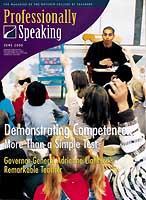Change Adds Flexibility to
Accreditation Process
The College's Executive Committee will now have the authority to appoint
up to three members of Council to an accreditation panel upon request by the Accreditation
Committee.
The change to the College's bylaw will help the Accreditation Committee constitute
panels for the accreditation of pre-service and in-service teacher education programs
across the province. The bylaw previously gave the Executive Committee the authority to
appoint Council members to French-language panels only because of the limited number of
bilingual members on Council.
Council Adopts Proposed
Accreditation Regulation
Council added a major building block in the development of the College's
professional affairs activities at its February 24 meeting by adopting a proposed
accreditation regulation under the Ontario College of Teachers Act. The
regulation will now be submitted to the government for approval.
The accreditation regulation will be used to accredit all pre-service and in-service
teacher education programs across the province. It will allow the College to require
providers of pre-service and in-service teacher education programs to reflect the Standards
of Practice for the Teaching Profession and meet standards prescribed by the
College's Accreditation Committee in their programs.
"The accreditation process is the control mechanism that is going to ensure that
teacher education programs are pertinent and that they efficiently prepare teachers for
the challenges of their duties," said Accreditation Committee Chair Cecilia Reynolds.
"Accredited programs will give the College the assurance that teachers have received
the initial education they need and are competent."
Programs requesting accreditation from the College will have to comply with the
requirements of Regulation 184/97 - Teachers Qualifications, in addition to the
requirements of the Accreditation Committee.
Accredited programs will receive one of five awards: accreditation granted,
accreditation granted with conditions, interim accreditation granted, interim
accreditation granted with conditions and accreditation not granted.
Standards of Practice Become College
Bylaw
Council agreed at its February 24 meeting to include the Standards
of Practice for the Teaching Profession in the College's bylaws. The decision
recognizes the importance of the standards under the Ontario College of Teachers Act and
their accurate reflection of the profession.
"The Standards of Practice for the Teaching Profession are a cornerstone
of our pre-service and in-service accreditation process," said Standards of Practice
and Education Committee Chair Clarice West-Hobbs. "With the standards entrenched in
our bylaws, we are ensuring that they apply to all members of the College and reflect
their professionalism. We are also telling future teachers this is what it means to be a
teacher."
The Standards of Practice for the Teaching Profession are available on the
College's web site at www.oct.ca/english/professional_affairs/standards.htm.
They are also available in a printed version in limited quantities.
Discipline
Decision
A panel of the College's Discipline Committee has ordered this
summary of a recent disciplinary case to be published in Professionally Speaking.
Member: David James Perryman
Decision: Certificates of Qualification and
Registration Revoked
A panel of the College's Discipline Committee held a public hearing February 28, 2000
into allegations of professional misconduct against David James Perryman, 46, of
Orangeville. Perryman was a 20-year veteran elementary school teacher for the Upper Grand
District Board of Education, formerly the Dufferin County Board of Education.
The allegations of professional misconduct against Perryman included failing to
maintain the standards of the profession, failure to comply with the Education Act,
contravening a law that is relevant to his suitability to hold Certificates of
Qualification and Registration, committing acts that would be regarded by members as
disgraceful, dishonourable and unprofessional and engaging in conduct unbecoming a member.
The allegations against Perryman arose out of a series of incidents involving a young
girl, aged 10 to 16 at the time of the incidents, who attended the school where Perryman
taught, but was not his student.
Perryman made a statement and submitted letters of support to the discipline panel at
the beginning of the hearing, after which he chose to leave.
The panel heard evidence from the victim that Perryman tried to touch her breasts on a
number of occasions, made comments of a sexual nature and engaged in sexual intercourse
with her on two occasions. The victim also testified that Perryman said to her that he
would be her teacher with respect to sexual activity.
The panel also heard that the teacher was charged with indecent assault under the Criminal
Code of Canada in November 1996. In June 1998, Perryman pleaded guilty to a reduced
charge of assault in connection with six incidents read into the court record. He was
sentenced to 45 days imprisonment to be served in the community, with specified terms and
conditions.
The College's discipline panel found that Perryman does not appreciate the significance
of his conduct outside the classroom and that he is guilty of professional misconduct. The
panel ordered his Certificates of Qualification and Registration revoked. The decision of
the panel will appear on the College's public register.
1 | 2 | 3 | 4
| 5 | 6

